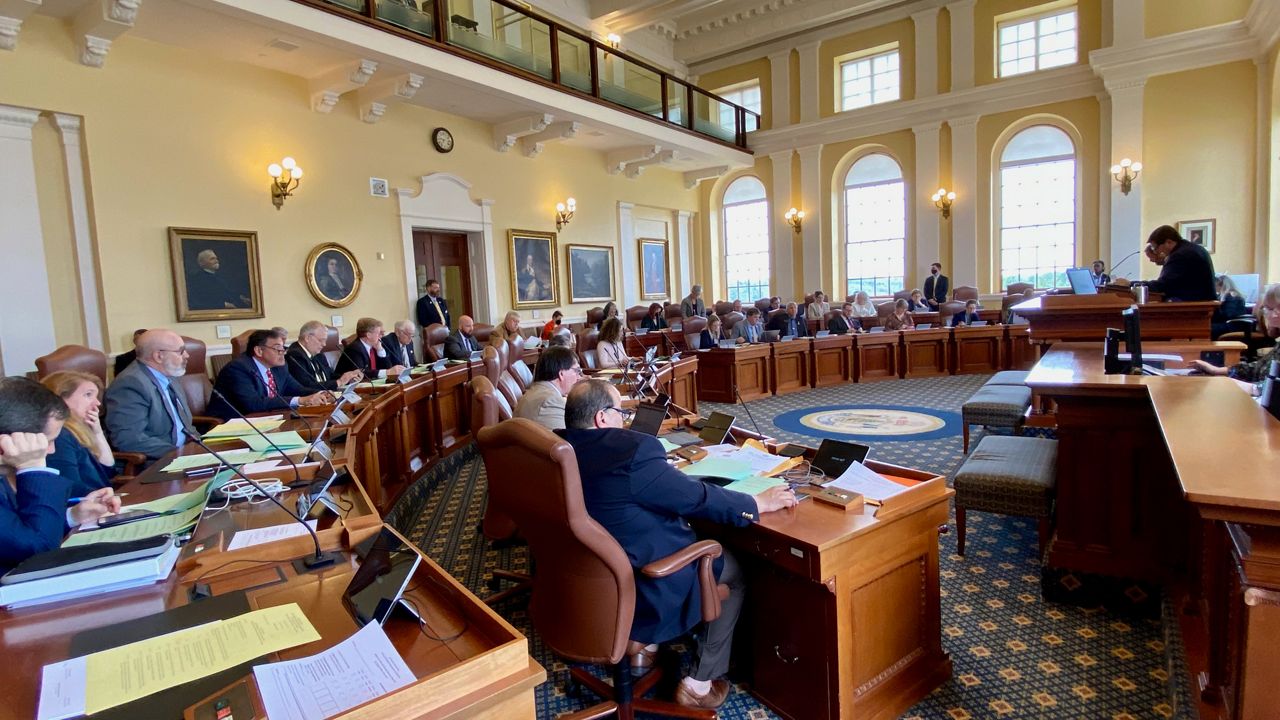A bill to create new accountability standards for electric utilities and another to expand a state law that aims to save the lives of those who have overdosed passed the legislature on Monday, the final day of the legislative session.
On a day marked by dozens of procedural votes and little debate, the Senate and House approved a revised measure that will be the “strongest Good Samaritan law in the country,” said bill sponsor Sen. Chloe Maxmin (D-Nobleboro).
As amended, the bill gives protection from arrest to those who render aid to someone who has overdosed unless they are suspected of a violent crime.
The Senate spent a few minutes debating LD 1959, which gives the Maine Public Utilities Commission the ability to set standards for Central Maine Power and Versant Power. It also outlines penalties if the utilities fail to meet the standards. The Senate voted 19-10 to enact the bill, which still needs to clear the House.
Sen. Mark Lawrence (D-Eliot) said the final version of the bill took hours of negotiation.
“The chief executive recognized the need to institute strong, real accountability for our foreign, investor-owned electric utilities,” he said.
The standards set by the PUC will cover reliability and customer service, set financial penalties and include “forced sale” as an option for utilities that fail to meet standards, Lawrence said.
Sen. Trey Stewart (R-Presque Isle) spoke against the bill, saying he believes it will allow the utility companies to blame the Legislature if they have to raise rates to comply with new standards.
“Affordability and cost have to be paramount to any rulemaking that goes on as a result of this bill, which will no doubt, no doubt, lead to rate increases for our constituents,” he said.
Fellow Republican Sen. Rick Bennett of Oxford said he preferred a stronger bill, but would support it.
“I disagree strongly with the idea that this is going to add costs to ratepayers,” he said. “I think just the reverse, in fact. I think having our utilities more accountable, more responsive to the people of Maine and more planful in the way they conduct their business, will inevitably save money.”
One of the bills that received final passage Monday was legislation to give Maine tribes more rights and the ability to conduct mobile sports betting.
Over in the House, members paid tribute to Rep. John Martin (D-Eagle Lake) who has served 54 years in the Legislature, including 20 as speaker. The longest serving legislator in state history, he is prevented by term limits from running again this year, but could opt to come back in two years.
House Majority Leader Michelle Dunphy (D-Old Town) said Martin provided invaluable institutional knowledge for all lawmakers.
“I believe we all work in the same way to help our constituents, but few with the power and fury of John Martin,” she said. “Any administrator in state government will tell you that when John Martin calls, you know you’ll be spending the rest of the day solving the problems he brought you.”
As speaker, Martin “recognized power and personified power,” and made several changes to professionalize the House, said Rep. Sawin Millett (R-Waterford). In later years, despite increasing political tension, Millett said he and Martin continue to be friends.
“Power was part of his quiver and he used those arrows very well and very effectively,” Millett said. “I never thought of him as anything but a friend. He treated me well during that era of high adversity.”
For his part, Martin did not say whether he will run again. He’s 80 and a year ago, suffered serious injuries in an accident, from which he has yet to fully recover. He recalled his days as speaker in which he prohibited lobbyists from sitting in lawmakers’ seats and banned smoking in the chamber. He set rules for decorum that continue to be followed today.
“As to what my future will bring, a year ago I didn’t think I had a future after that accident,” he said. “I’m thankful to God for having come through that and I’m almost back to where I want to be in health.”

As of late afternoon, lawmakers continued to finish up final votes. For many bills left pending, that will likely mean the need for the measure to be reintroduced next year when the new Legislature meets in January.
One such bill is most certainly LD 1550, which would ban flavored tobacco products. Bangor, Portland and Brunswick have approved bans, but the group Flavors Hook Kids Maine is hoping for a statewide ban. They stood with bright yellow signs in the hallway outside the House Monday as lawmakers filed into the chamber.
“We’ve done everything we can,” said Julia Panepinto, field director for the group. “I think we have a chance but it gets smaller every minute we’re in this hallway.”



